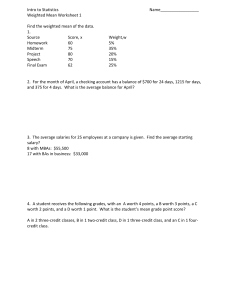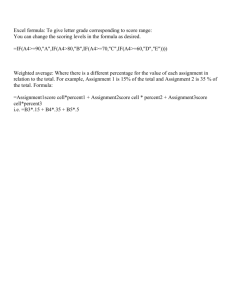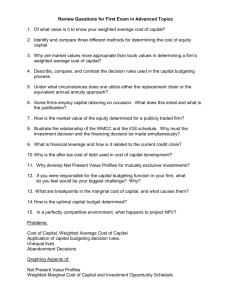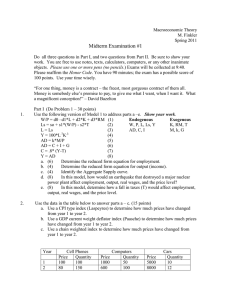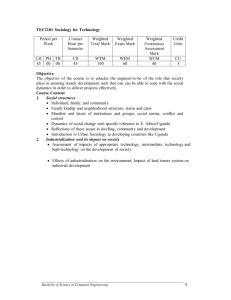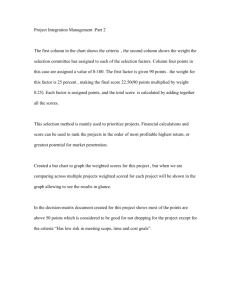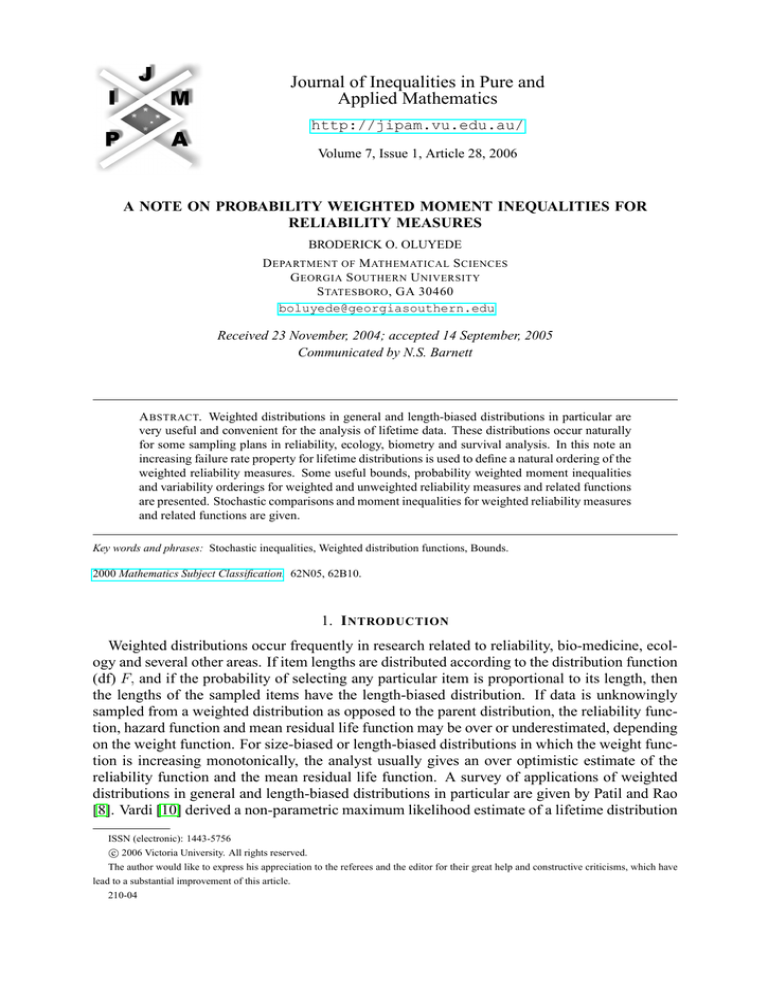
Journal of Inequalities in Pure and
Applied Mathematics
http://jipam.vu.edu.au/
Volume 7, Issue 1, Article 28, 2006
A NOTE ON PROBABILITY WEIGHTED MOMENT INEQUALITIES FOR
RELIABILITY MEASURES
BRODERICK O. OLUYEDE
D EPARTMENT OF M ATHEMATICAL S CIENCES
G EORGIA S OUTHERN U NIVERSITY
S TATESBORO , GA 30460
boluyede@georgiasouthern.edu
Received 23 November, 2004; accepted 14 September, 2005
Communicated by N.S. Barnett
A BSTRACT. Weighted distributions in general and length-biased distributions in particular are
very useful and convenient for the analysis of lifetime data. These distributions occur naturally
for some sampling plans in reliability, ecology, biometry and survival analysis. In this note an
increasing failure rate property for lifetime distributions is used to define a natural ordering of the
weighted reliability measures. Some useful bounds, probability weighted moment inequalities
and variability orderings for weighted and unweighted reliability measures and related functions
are presented. Stochastic comparisons and moment inequalities for weighted reliability measures
and related functions are given.
Key words and phrases: Stochastic inequalities, Weighted distribution functions, Bounds.
2000 Mathematics Subject Classification. 62N05, 62B10.
1. I NTRODUCTION
Weighted distributions occur frequently in research related to reliability, bio-medicine, ecology and several other areas. If item lengths are distributed according to the distribution function
(df) F, and if the probability of selecting any particular item is proportional to its length, then
the lengths of the sampled items have the length-biased distribution. If data is unknowingly
sampled from a weighted distribution as opposed to the parent distribution, the reliability function, hazard function and mean residual life function may be over or underestimated, depending
on the weight function. For size-biased or length-biased distributions in which the weight function is increasing monotonically, the analyst usually gives an over optimistic estimate of the
reliability function and the mean residual life function. A survey of applications of weighted
distributions in general and length-biased distributions in particular are given by Patil and Rao
[8]. Vardi [10] derived a non-parametric maximum likelihood estimate of a lifetime distribution
ISSN (electronic): 1443-5756
c 2006 Victoria University. All rights reserved.
The author would like to express his appreciation to the referees and the editor for their great help and constructive criticisms, which have
lead to a substantial improvement of this article.
210-04
2
B RODERICK O. O LUYEDE
F, on the basis of two independent samples, one sample of size m, from F, and the other a sample of size n, from the length-biased distribution of F, and studied its distributional properties.
Gupta and Keating [4] obtained results on relations for reliability measures under length-biased
sampling. Oluyede [7] obtained useful results on inequalities and selection of experiments for
length-biased distributions, and investigated certain modified length-biased cross-entropy measures. Also, see Daniels [2], Bhattacharyya et al [1], Zelen and Feinleib [11] and references
therein for additional results on weighted distributions.
Let X be a non-negative random variable with distribution function F and probability density
function (pdf) f . The weighted random variable XW , has a survival function given by,
GW (x) =
(1.1)
F (x)(W (x) + TF (x))
,
EF (W (X))
R∞
0
0
where TF (x) = x (F (u)W (u)du)/F (x), and W (u) = dW (u)/du, assuming that W (x)F (x)
→ 0 as x → ∞. The probability density function of the survival function given in (1.1) is referred to as a weighted distribution with weight function W (x) ≥ 0. If W (x) = x in (1.1),
the resulting function is referred to as the length-biased reliability function. The purpose of this
note is to establish and compare inequalities for weighted distributions including length-biased
distributions. An increasing failure rate property (IFRP) for lifetime distributions is used to define a natural ordering of the weighted reliability measures and some implications are explored.
We establish some moment type inequalities for the comparisons of length-biased and weighted
distributions with the parent distributions. Some important utility notions, including useful and
meaningful inequalities, are presented in Section 2. Section 3 is concerned with orderings, including the increasing failure rate property (IFRP) ordering for weighted reliability measures
and related functions. Stochastic comparisons and moment inequalities involving reliability
functions, are presented in Section 4.
2. U TILITY N OTIONS AND BASIC R ESULTS
In this section, we give some definitions and useful concepts. Let F be the set of absolutely
continuous distribution functions satisfying
(2.1)
H(0) = 0,
lim H(x) = 1,
x→∞
sup{x : H(x) < 1} = ∞.
Note that if the mean of a random variable in F is finite, it is positive. We begin by presenting
some definitions. Let F and G denote the distribution functions of the random variables X and
Y respectively. Also, let F (x) = 1 − F (x) and G(x) = 1 − G(x) be the respective reliability
functions. A class of moments, called probability weighted moments (PWM), was introduced
by Greenwood et al [3].
Definition 2.1. The PWM is given by
k
Ml,k,j = E[X l F j F ],
(2.2)
where l, k, j are real numbers and F (x) = 1 − F (x).
Example 2.1 (IRLS and Hazard Functions). In the iterative reweighted least-square (IRLS)
algorithm for the maximum likelihood fitting of the binary regression model, the expressions in
the algorithm for the weights are given by,
(2.3)
W −1 = (f (θ))−2 F (θ)F (θ)
which can be expressed in terms of the hazard functions hF (θ) and λF (θ), that is,
f (θ) f (θ)
(2.4)
W =
= hF (θ)λF (θ),
F (θ) F (θ)
J. Inequal. Pure and Appl. Math., 7(1) Art. 28, 2006
http://jipam.vu.edu.au/
P ROBABILITY W EIGHTED M OMENT I NEQUALITIES
3
where the relationship between the fitted response probability p, and the linear predictor θ is
given by p = F (θ), the derivative dθ/dp = 1/f (θ), and f (θ) = dF (θ)/dθ is the probability
density function of the predictor. Clearly, the expectation of the expression for the weights
in the reweighted least-square (IRLS) algorithm for maximum likelihood fitting of the binary
regression model is the probability weighted moment of (f (θ))−2 , that is,
E[W −1 ] = E[(f (θ))−2 F (θ)F (θ)].
(2.5)
Following Greenwood et al [3], we define the following probability weighted moment (PWM)
order for life distributions F and G.
Definition 2.2. Let F and G be in F, and set p = l + 1, then F is said to be larger than G in
PWM(l, k, j) ordering, (F ≥P W M (l,k,j) G) if
Z ∞
Z ∞
k
k
p−1 j
(2.6)
x F (x)F (x)dF (x) ≥
xp−1 Gj (x)G (x)dG(x)
t
t
for all t ≥ 0.
Next we present some basic definitions for the comparisons of reliability functions of two
random variables X and Y. These definitions involve the hazard function λF (x) = f (x)/F (x),
and the reverse hazard function hF (x) = f (x)/F (x), where f (x) = dF (x)/dx is the probability density function (pdf) of the random variable X. Note that the function hF (x) behaves like
the density function f (x) in the upper tail of F (x). See Szekli [9] for details on these and other
ageing concepts.
Definition 2.3.
(i) Let X and Y be random variables with distribution functions F and G respectively. We
say that X is larger than Y in stochastic ordering (X ≥st Y ) if F (t) ≥ G(t) for all
t ≥ 0.
(ii) A random variable X with distribution function F is said to have a decreasing (increasing) hazard rate if and only if F (x + t)/F (x) is increasing (decreasing) in x ≥ 0, for
every t ≥ 0.
(iii) Suppose µG and µH are finite. We say G preceeds H in mean residual life and write
G ≤mr H if for every t ≥ 0,
Z ∞
Z ∞
(2.7)
H(y)dy ≥
G(y)dy.
t
t
The MR ordering is a partial ordering on the class of distributions of non-negative random
variables with finite mean. Note that if Gl and Hl are length-biased Rdistribution functions with
∞
F ≤Rst K and µF = µK , then Gl ≥mr Hl , where Gl (t) = µ−1
xdF (x), and H l (t) =
F
t
∞
−1
µK t xdK(x) respectively.
Definition 2.4.
(i) If F and G are in F, we say that G has more tail at the origin than F, denoted by
F <T OP G, if
hG (x) ≥ hF (x),
(2.8)
where hF (x) = f (x)/F (x), for all x ≥ 0, is the reverse hazard function.
(ii) If F and G are in F, we say that G has larger tail than F, denoted by F <LT P G, if
λF (x)
λG (x)
≥
,
(2.9)
hF (x)
hG (x)
where λF (x) = f (x)/F (x), for all x ≥ 0.
J. Inequal. Pure and Appl. Math., 7(1) Art. 28, 2006
http://jipam.vu.edu.au/
4
B RODERICK O. O LUYEDE
(iii) A life distribution F is said to have a larger increasing failure rate than the life distribution G, denoted by F ≥IF RP G, if and only if
P (X > x2 |X > y1 )
P (Y > x2 |X > x1 )
(2.10)
≥
P (X > y2 |X > y1 )
P (Y > y2 |X > y1 )
for all x1 < x2 , x1 < y1 , y1 < y2 , x2 < y2 .
The next definition is mainly due to Loh [6].
Definition 2.5. An absolutely continuous distribution function F on (0, ∞) for which lim+
x→0
F (x)
x
exists is:
(i) new better than used in average failure rate (NBAFR) if
Z t
−1
λF (0) = lim+ t
λF (x)dx
t→0
0
Z t
−1
(2.11)
≤t
λF (x)dx,
0
for t > 0,
(ii) new better than used in failure rate (NBUFR) if there exists a version of λF of the failure
or hazard rate such that
λF (0) ≤ λF (t),
(2.12)
for all t > 0, where λF (0) is given by (2.11). The inequalities are reversed for new
better than used in average failure rate (NBAFR) and new worse than used in failure
rate (NWUFR) respectively.
The class of NBUFR (NWUFR) enjoys many desirable properties under several reliability operations. This class also includes any life distribution with λF (0) = 0. Clearly, F ∈ N BU F R
if and only if
F (x + t) ≤ exp{−λF (0)t}F (x),
(2.13)
for all x, t ≥ 0.
Theorem 2.1. Let Gl (t) and H l (t) be length-biased reliability functions. If there exists a > 0
such that for every v > 0 and β > 0, there is a t0 such that
λGl (v + βt) > λHl (t) + a,
for every t > t0 , then Gl (t) > H l (t) for all t > t0 , and Gl ≥mr Hl for all t > t0 .
Proof. For all t > t0 and some a > 0, we have for t0 < t1 < t2 ,
Z t2
Z t2
(2.14)
λGl (t)dt >
λHl (t)dt + a(t2 − t1 ).
t1
t1
This is equivalent to
(2.15)
log
Gl (t1 )
Gl (t2 )
> log
H l (t1 )
H l (t2 )
+ a(t2 − t1 ),
that is,
Gl (t1 )
Gl (t2 ) a(t2 −t1 )
>
e
.
H l (t1 )
H l (t2 )
Hence, there exists tu > t0 such that Gl (t) > H l (t), for all t > t0 .
Consequently, Gl ≥mr Hl for all t > t0 .
J. Inequal. Pure and Appl. Math., 7(1) Art. 28, 2006
http://jipam.vu.edu.au/
P ROBABILITY W EIGHTED M OMENT I NEQUALITIES
5
Theorem 2.2. Let F be absolutely continuous on [0, ∞). Suppose F (x)/x has aR limit as x → 0
∞
xdF (x).
from above. Then F ∈ N W U F R implies G ∈ N W U F R, where Gl (t) = µ−1
F
t
Proof. Note that F ∈ N W U F R if and only if
F (x + t) ≥ exp{−λF (0)t}F (x),
(2.16)
for all x, t ≥ 0. The left side of (2.16) satisfies
Gl (x + t) ≥ F (x + t),
R∞
for all x, t ≥ 0, where Gl (t) =
xdF (x). Now,
t
Z t
Z t
λF (x)dx ≤
λGl (x)dx
(2.17)
µ−1
F
0
0
for all t ≥ 0, so that
λF (0)t ≤ λGl (0)t,
(2.18)
for all t ≥ 0. From (2.17) and (2.18) we have
exp{−λF (0)t}F (x) ≥ exp{−λGl (0)t}Gl (x),
(2.19)
for all x, t ≥ 0.
Consequently,
(2.20)
Gl (x + t) ≥ F (x + t) ≥ exp{−λF (0)t}F (x) ≥ exp{−λGl (0)t}Gl (x),
for all x, t ≥ 0.
In a similar manner, one can show that if Gi , i = 1, 2, are length-biased distribution functions
on [0, ∞) for which limx→0+ Gi (x)/x < ∞ and limx→0+ Fi (x)/x < ∞, i = 1, 2, then G1 ∗
G2 ∈ N W U F R. This follows from the fact that G1 ∗ G2 (x) ≤ F1 ∗ F2 (x) ≤ F1 (x)F2 (x) for
every x ∈ (0, ∞), where G1 ∗ G2 is the convolution of the distribution functions G1 and G2
respectively.
Example 2.2 (Rayleigh Distribution). The Rayleigh distribution plays an important role in applied probability and statistics. The probability density function is given by,
x 2
−1/2 −1
(2.21)
f (x; θ) = 2π
θ exp −
,
θ
for x > 0, θ > 0. The corresponding length-biased reliability and hazard functions are given
by,
√
F (x; θ) = 2[1 − Φ( 2x/θ)]
and
√ √
2φ( 2x/θ)
√
λF (x; θ) =
,
θ[1 − Φ( 2x/θ)]
where Φ and φ are the standard normal distribution and density functions, respectively. Let
XW be the corresponding weighted random variable with weight function W (x) = x. The
probability density function of XW is given by,
x 2
−2
(2.22)
gl (x; θ) = 2xθ exp −
,
θ
for x > 0, θ > 0. The reliability and hazard functions are Gl (x; θ) = exp{−(x/θ)2 }, x > 0,
and λGl (x; θ) = 2x/θ2 , x > 0, respectively. Clearly, Gl (x + t; θ) ≥ F (x + t; θ), for all x, t ≥ 0,
and λGl (0) = 0. In view of Theorem 2.2, we get that Gl ∈ N W U F R.
J. Inequal. Pure and Appl. Math., 7(1) Art. 28, 2006
http://jipam.vu.edu.au/
6
B RODERICK O. O LUYEDE
3. S OME O RDERINGS FOR W EIGHTED R ELIABILITY M EASURES
Let X be a non-negative random variable with distribution function F and mean µ = E(X)
and let Xe be a non-negative random variable with distribution function
R∞
P (X ≥ t)dt
(3.1)
Fe (x) = 0
,
µ
x ≥ 0. The k th moment of the random variable Xe is given by
Z ∞
k
E(Xe ) = k
xk−1 F e (x)dx
R ∞0 k
t F (t)dt
= 0
µF
E(X k+1 )
(3.2)
=
(k + 1)µF
R∞
where F (·) = 1 − F (·) and µF = 0 F (u)du. The distribution function Fe (x) is called the
stationary renewal distribution with mean remaining or residual life given by
Z ∞
1
F (y)dy,
(3.3)
µ(t) =
F (t) t
t ≥ 0. The mean remaining life and failure rate function of Fe are given by
R∞
F (y)µ(y)dy
(3.4)
µFe (t) = t
F (t)µ(t)
and λe (t) = [µ(t)]−1 respectively, t ≥ 0.
If W (x) = x in equation (1.1), then the corresponding probability density function (pdf) is
called the length-biased pdf and is given by
gl (x) =
(3.5)
xf (x)
,
µ
x ≥ 0. The corresponding k th moment is
E(Xlk ) =
(3.6)
E(X k+1 )
.
µF
Proposition 3.1. E(Xek ) > E(Xlk ) for k < 0 and E(Xek ) ≤ E(Xlk ) for k ≥ 0.
Proposition 3.2. Let GW be a weighted distribution function with increasing weight function
W (x), x ≥ 0, and F the parent distribution function respectively, then F <LT P GW .
Proof. Let GW be a weighted distribution function with increasing weight function W (x), x ≥
0, then,
GW (x) ≥ F (x),
(3.7)
for all x ≥ 0. Equivalently,
(3.8)
GW (x) − F (x)GW (x) ≥ F (x) − F (x)GW (x),
for all x ≥ 0. This is equivalent to
(3.9)
J. Inequal. Pure and Appl. Math., 7(1) Art. 28, 2006
F (x)
GW (x)
≥
,
F (x)
GW (x)
http://jipam.vu.edu.au/
P ROBABILITY W EIGHTED M OMENT I NEQUALITIES
7
for all x ≥ 0, which in turn is seen to be equivalent to
gW (x)/GW (x)
f (x)/F (x)
≥
,
f (x)/F (x)
gW (x)/GW (x)
for all x ≥ 0. Consequently, F <LT P GW .
(3.10)
Example 3.1 (Exponential Distribution). The most useful model in reliability studies is the
exponential failure model with pdf given by,
n xo
(3.11)
f (x; θ) = θ−1 exp −
,
θ
for x > 0 and θ > 0. It is well known that the reliability and failure rate functions are F (x; θ) =
exp{−x/θ} and λF (x; θ) = θ−1 respectively. Let W (x) = x, then the reliability and hazard
x
functions are given by, GW (x; θ) = {1 + xθ } exp{−x/θ} and λGW (x, θ) = θ(x+θ)
respectively.
Clearly, GW (x; θ) ≥ F (x; θ) and λGW (x, θ) ≤ λF (x; θ), for all x > 0 and θ > 0. In view of
Proposition 3.2, F <LT P GW .
Proposition 3.3. Let GW be a weighted distribution function with increasing weight function
W (x), x ≥ 0, and F the parent distribution function respectively. If W (x) = x and x ≥ µF > 0
then F <T OP GW .
Proof. Let W (x) = x, then the length-biased reliability function is given by
GW (x) =
(3.12)
F (x)VF (x)
,
µF
where VF (x) = E(X|X > x) is the vitality function. Clearly, GW (x) ≥ F (x), for all x ≥ 0.
Now, if x ≥ µF > 0, then gW (x) = xfµ(x)
≥ f (x), so that (GW (x))−1 ≥ (F (x))−1 , and
F
(3.13)
hF (x) =
gW (x)
f (x)
≤
= hGW (x).
F (x)
GW (x)
Consequently,
(3.14)
hGW (x) ≥ hF (x),
for all x ≥ µF > 0.
Proposition 3.4. Let GW be a weighted distribution function with increasing weight function
W (x), x ≥ 0, and F the parent distribution function respectively, then GW <IF RP F.
Proof. Note that λGW (x) ≤ λF (x) for all x ≥ 0, whenever W (x) is an increasing weight
function, where λF (x) = f (x)/F (x), F (x) > 0. However, λGW (x) ≤ λF (x) implies
Z ∞
Z ∞
dGW (t)
dF (t)
(3.15)
≤
,
1 − GW (t)
1 − F (t)
x
x
that is,
F (y2 ) − F (x2 )
GW (y2 ) − GW (x2 )
(3.16)
≤
,
F (y1 ) − F (x1 )
GW (y1 ) − GW (x1 )
for all x1 < x2 , x1 < y1 , y1 < y2 , x2 < y2 . Consequently,
F (x2 ) − F (y2 )
GW (x2 ) − GW (y2 )
≤
,
F (x1 ) − F (y1 )
GW (x1 ) − GW (y1 )
for all x1 < x2 , x1 < y1 , y1 < y2 , x2 < y2 , and GW <IF RP F.
(3.17)
J. Inequal. Pure and Appl. Math., 7(1) Art. 28, 2006
http://jipam.vu.edu.au/
8
B RODERICK O. O LUYEDE
Example 3.2 (Pareto Distribution). The Pareto distribution arises in reliability studies as a
gamma mixture of the exponential distribution. See Harris [5]. The reliability and failure rate
functions are given by, F (x; α, β) = (1 + βx)−α , and λF (x; α, β) = αβ(1 + βx)−1 , for x > 0,
β > 0, and α > 1. Let W (x) = x, then the corresponding length-biased reliability and hazard
functions are
GW (x; α, β) = (1 + βx)−α (1 + αβx) = F (x; α, β)[1 + αβx],
and
β(α − 1)x
,
1 + αβx
for x > 0, β > 0, and α > 1. Clearly GW (x; β) ≥ F (x; β) and λGW (x; β) ≤ λF (x; β). In view
of Proposition 3.4, GW <IF RP F.
λGW (x; α, β) = αβ(1 + βx)−1
4. C OMPARISONS AND M OMENT I NEQUALITIES FOR R ELIABILITY M EASURES
Let fW and gW be two non-negative integrable functions, possibly weighted probability density functions. A natural and common approach to ordering of distribution functions F and
G with probability density functions f and g (pdf) respectively is concerned with the rate at
which the density tends to zero at infinity. A pdf f is said to have a lighter tail than a pdf g
if f (x)/g(x) −→ 0 as x → ∞. Let gl and gW be the length-biased and weighted probability density functions respectively. The length-biased probability density function is a weighted
probability density function with weight function W (x) = x. The corresponding length-biased
reliability function is given by
Gl (x) =
(4.1)
F (x)VF (x)
,
µF
where VF (x) = E(X|X > x) is the vitality function and the length-biased probability density
function (pdf) is given by gl (x) = xfµ(x) . Note that f (x)/gl (x) = µF /x −→ 0 as x → ∞, that
F
is, the length-biased distribution has a heavier tail than the original distribution. Indeed,
Gl (x) ≥ F (x),
(4.2)
for all x ≥ 0.
Theorem 4.1. Let GW be a weighted distribution function with weight function W (x), x ≥ 0,
and F the parent distribution function. If W (x) = x and EF X k ≤ EF (X k+1 )/µF for all k ≥ 0,
then
Z ∞
(4.3)
ΨGW (t) =
etx dGW (x) ≥ ΨF (t),
0
for all t ≥ 0.
Proof.
Z
∞
ΨGW (t) =
tx
Z
e dGW (x) =
0
∞
k
X
∞
∞X
0
k=0
(tx)k
dGW (x)
k!
∞
k
X
t
t EF X k+1
k
=
EG X =
k! W
k! µF
k=0
k=0
Z
∞
∞
∞X
X
tk
(tx)k
≥
EF X k =
dF (x)
k!
k!
0
k=0
k=0
(4.4)
= ΨF (t),
J. Inequal. Pure and Appl. Math., 7(1) Art. 28, 2006
http://jipam.vu.edu.au/
P ROBABILITY W EIGHTED M OMENT I NEQUALITIES
9
for all t ≥ 0.
Example 4.1 (Gamma Distribution). The gamma distribution is used to model lifetimes of
various practical situations, including lengths of time between catastrophic events, and lengths
of time between emergency arrivals at a hospital. The pdf is given by,
β α α−1 −βx
(4.5)
f (x; α, β) =
x e ,
Γ(α)
α
β
, for t < β. The length-biased gamma
for x > 0, α > 0, and β > 0. Clearly, ΨF (t) = β−t
pdf is given by,
β α+1
(4.6)
gl (x; α, β) =
xα+1−1 e−βx ,
Γ(α + 1)
α+1
β
for x > 0, α > 0, and β > 0. Note that ΨGW (t) = β−t
, for t < β. In view of Theorem
4.1, we get that ΨGW (t) ≥ ΨF (t) for all t ≥ 0.
Theorem 4.2. Let GW be a weighted distribution function with increasing weight function
W (x), x ≥ 0, and F the parent distribution function. If ψ is a non-negative and non-decreasing
function on (0, ∞), then
Z ∞
Z ∞
p
k
ψ p (x)F k (x)dx,
(4.7)
ψ (x)GW (x)dx ≤
0
0
for all t ≥ 0 and p > 0.
Proof. Note that GW (x) ≤ F (x) for all x ≥ 0, whenever W (x) is increasing in x. For any
integer k ≥ 1, GkW (x) ≤ F k (x). It follows therefore that
Z ∞
Z ∞
p
k
(4.8)
ψ (x)GW (x)dx ≤
ψ p (x)F k (x)dx,
t
t
for all t ≥ 0 and p > 0. The result follows by letting t → 0+ .
Theorem 4.3. Let W (x) = x ≥ µF and Gl the length-biased reliability function, then
Z ∞
Z ∞
p−1
(4.9)
x Gl (x)dGl (x) ≥
xp−1 F (x)dF (x),
0
0
for all t ≥ 0.
Proof. Note that for x ≥ µF > 0, Gl (x) ≥ F (x) and gl (x) ≥ f (x). So that xp−1 Gl (x) ≥
xp−1 F (x), and
Z ∞
Z ∞
p−1
(4.10)
x Gl (x)dGl (x) ≥
xp−1 F (x)dF (x),
t
t
Consequently,
Z
∞
x
(4.11)
p−1
Z
Gl (x)dGl (x) ≥
0
∞
xp−1 F (x)dF (x),
0
+
by letting t → 0 .
Corollary 4.4. Let Gl be the length-biased distribution function, then under the conditions of
Theorem 4.2,
Z ∞
Z ∞
2
(4.12)
f (x)dx ≤
gl2 (x)dx,
0
where gl (x) =
xf (x)
µF
0
is the length-biased probability density function, and 0 < µF < ∞.
J. Inequal. Pure and Appl. Math., 7(1) Art. 28, 2006
http://jipam.vu.edu.au/
10
B RODERICK O. O LUYEDE
Example 4.2 (Log-logistic Distribution). The log-logistic distribution is a useful model that
provides a good fit to a wide variety of data, including mortality, precipitation, and stream
flow. The log-logistic distribution is mathematically tractable and provides a reasonably good
alternative to the Weibull distribution. The reliability function is given by,
1
F (x; α, β) =
β ,
1 + αx
for x > 0, α > 0, and β > 1. The hazard function is
β
λF (x; α, β) =
α
1+
x β−1
α
,
x β
α
for x > 0, α > 0, and β > 1. The PWM with l = 1, j = s, and k = 0 is
x β−1
Z ∞
β
x βs
s
0
α
α
α
E[X(F (X)) (F (X)) ] =
x
β dx
x β s
0
[1 + α ] [1 + αx ]2
αΓ s + 1 + β1 Γ 1 − β1
(4.13)
=
,
Γ(s + 2)
for s = 0, 1, 2, . . . , and β > 1. Applying Definition 2.2, and Theorem 4.2, for fixed α, we have
F ≥P W M (1,s,0) G, if and only if
1
1
1
1
Γ 1−
≥Γ s+1+
Γ 1−
.
Γ s+1+
β1
β1
β2
β2
In particular, F ≥P W M (1,1,0) G, if and only if
1 + β1
1 + β2
µF ≥
µ ,
2β1
2β2 G
where
−1
1
1
απ
π
µF =
F (y : α, β)dy = αΓ 1 +
Γ 1−
=
sin
.
β
β
β
β
0
For fixed β, F ≥P W M (1,s,0) G, if and only if α1 ≥ α2 .
Z
∞
R EFERENCES
[1] B.B. BHATTACHARYYA, L.A. FRANKLIN AND G.D. RICHARDSON, A comparison of nonparametric unweighted and length-biased density estimation of fibers, Commun. Statist.-Theory
Meth., 17(11) (1988), 3629–3644.
[2] H.E. DANIELS, A new technique for the analysis of fibre length distribution in wool, J. Text. Inst.,
33 (1942), 137–150.
[3] J. A. GREENWOOD, J.M. LANDWEHR, N.C. MATALAS AND J.R. WALLIS, Probability
weighted moments: definitions and relations to parameters of several distributions expressable in
inverse form, Water Resources Research, 15(5) (1979), 1049–1064.
[4] R.C. GUPTA AND J.P. KEATING, Relations for reliability measures under length biased sampling,
Scan. J. Statist., 13 (1985), 49–56.
[5] C.M. HARRIS, The Pareto distribution as a queue discipline, Operations Research, 16 (1968),
307–313.
[6] W.Y. LOH, Some generalization of the class of NBU distributions, IEEE Trans. Reliability, 33
(1984), 419–422.
J. Inequal. Pure and Appl. Math., 7(1) Art. 28, 2006
http://jipam.vu.edu.au/
P ROBABILITY W EIGHTED M OMENT I NEQUALITIES
11
[7] B.O. OLUYEDE, On inequalities and selection of experiments for length-biased distributions,
Probability in the Engineering and Informational Sciences, 13 (1999), 169–185.
[8] G.P. PATIL AND C.R. RAO, Weighted distributions and size-biased sampling with applications to
wildlife and human families, Biometrics, 34 (1978), 179–189.
[9] R. SZEKLI, Stochastic Ordering and Dependence in Applied Probability, Lecture Notes in Statistics, Springer-Verlag, (1997).
[10] Y. VARDI, Nonparametric estimation in the presence of bias, Ann. Statist., 10(2) (1982), 616–620.
[11] M. ZELEN AND M. FEINLEIB, On the theory of screening for chronic diseases, Biometrika, 56
(1969), 601–614.
J. Inequal. Pure and Appl. Math., 7(1) Art. 28, 2006
http://jipam.vu.edu.au/

